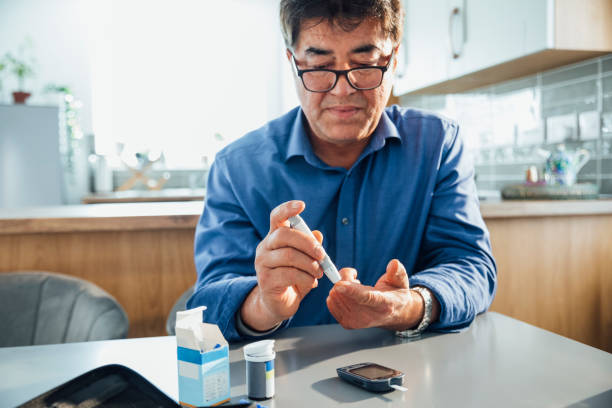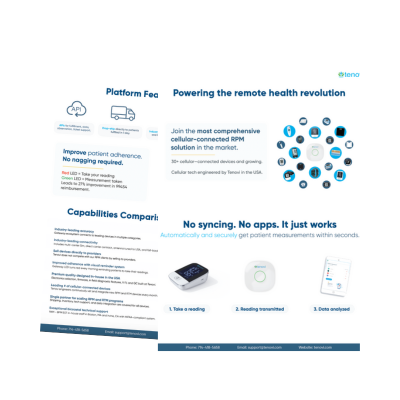In the United States, 6 in 10 adults live with chronic disease. Connected health devices offer a valuable solution for proactive monitoring of chronic disease. Connected health devices used in chronic care can strengthen communication between patients and healthcare providers. These devices, such as blood pressure monitors, glucose meters, and oxygen sensors, wirelessly transmit real-time health data to physicians.
This article explores connected health devices as a solution that empowers patients and healthcare teams to manage chronic illnesses effectively, improving outcomes and quality of life.
Connected Health Devices in Chronic Care Management
Connected health devices, remote patient monitoring devices, and smart health devices are terms used for medical devices that monitor and help manage biometric data and an individual’s health. These devices connect to physician networks with cellular or Bluetooth technology. That connectivity allows them to collect and transmit data for analysis and interpretation.
RPM healthcare solutions and connected health devices offer many opportunities, from clinical trials to detecting conditions early and preventing complications. This is key when considering the interconnected nature of chronic diseases. Connected health devices include thermometers, blood pressure monitors, pulse oximeters, peak flow meters, glucometers, and scales. In addition, smartwatches can be used in chronic care to track steps, heart rate, and daily sleep duration.
Chronic conditions can have a slow and subtle onset, making detecting their progression difficult. This is concerning as the deterioration can go unnoticed. However, connected health devices inform healthcare providers when patient measurements exceed set thresholds. Physicians can then promptly identify and effectively manage concerns.
The following sections explore the benefits connected health devices offer in managing specific chronic care conditions.
Asthma
Over 25 million individuals in the United States have asthma, a chronic respiratory condition whose symptoms can escalate into a medical emergency. RPM medical solutions allow asthmatics to monitor and manage their condition effectively through remote peak flow meter monitoring. A peak flow meter is among the many connected health devices used in remote patient monitoring. Remote peak flow meters help patients manage asthma by measuring the maximum airflow out of the lungs.
COPD
Connected health devices are also used to monitor patients with COPD. Monitoring blood oxygen levels with a pulse oximeter is crucial for effectively treating pulmonary conditions. Since respiratory symptoms of chronic obstructive pulmonary disease are not always evident, frequent monitoring of lung capacity or blood oxygen levels airs in early detection and timely intervention.
People with mild COPD symptoms may experience significant drops in blood oxygen levels without realizing it. However, by using remote pulse oximetry devices, patients can take daily measurements of their blood oxygen levels. These readings are then automatically transmitted to their physician. This way, even if the patient is unaware of a drop in their blood oxygen, their doctor will be alerted and can consider adjusting the treatment plan as needed.
Diabetes
Effective diabetes management necessitates frequent blood glucose monitoring. Introducing connected health devices for diabetes has revolutionized how individuals with diabetes can monitor their health. Remote blood glucose monitoring allows patients to track their blood sugar levels quickly, efficiently, and conveniently. In addition, healthcare providers automatically receive each reading for analysis.
Hypertension
Individuals with hypertension can employ remote blood pressure monitoring to track their blood pressure regularly. This device simplifies the process by collecting and transmitting readings with one touch. In addition, providers can track a patient’s blood pressure trends for hypertension over time. Connected health devices alert patients and physicians to potentially dangerous spikes in blood pressure that may necessitate urgent intervention.
Obesity
Remote weight monitoring allows patients to take frequent body weight measures that are automatically transmitted to their healthcare provider. With connected health devices like wireless RPM scales, healthcare providers can use this data to spot trends, track adherence to treatment plans, and evaluate the effectiveness of a weight management program. Frequent body weight measurements also help patients see how lifestyle choices directly impact their health.
Connected Health Devices and Early Disease Detection
Connected health devices allow more frequent health monitoring between doctor visits, giving providers a comprehensive picture of a patient’s condition. This frequent data enables early detection when health metrics deviate from the normal range, alerting patients and doctors. Early detection mitigates the risk of sudden deterioration and complications.
By regularly tracking vital signs, providers can intervene promptly to prevent one chronic issue from exacerbating another, such as poorly controlled diabetes leading to hypertension. Remote monitoring programs foster better communication between patients and providers, increasing confidence in managing conditions.
Integrated patient data from connected devices facilitates collaborative care planning and treatment optimization during office visits. Providers can also easily track patient adherence to care plans, enabling personalized and comprehensive care.
In summary, connected health devices allow early detection of health issues, prevent complications, improve patient-provider communication, enable collaborative care planning, and facilitate adherence tracking – ultimately leading to better chronic disease management.
Empowering Patients with Connected Health Devices
Connected health devices enable patients to take a proactive role in pursuing their wellness objectives. With the ability to monitor health readings daily, patients can effortlessly track their progress. Frequent monitoring of health measures allows patients to observe the direct impact of lifestyle choices, like exercise and diet, on their overall health. By gaining real-time insights into their health data, patients are empowered to make informed decisions and actively participate in improving their well-being.
Connected Health Devices & Benefits for Healthcare Teams
Healthcare systems face significant strain due to various factors. However, implementing RPM technology has become a valuable tool for healthcare providers to oversee patient care effectively. Healthcare professionals can proactively manage patient care by embracing remote patient monitoring. RPM proves especially beneficial for individuals with well-controlled chronic conditions, as it reduces the likelihood of needing more expensive resources for acute care interventions.
With the patient’s consent, connected health devices enable the entire care team to access their health data. This is particularly valuable for patients with complex health profiles, as the data from these devices promote enhanced collaboration among healthcare providers. With a comprehensive view of a patient’s health information, the care team can work together more effectively, ensuring coordinated and informed decision-making for the patient.
Tenovi
Tenovi, a provider of remote patient monitoring medical devices, offers a range of FDA-cleared devices with user-friendly designs that promote high user adoption and retention rates. These devices include blood pressure monitors, peak flow meters, pulse oximeters, blood glucose monitors, and scales.
Additionally, Tenovi provides chronic care, telehealth, and remote patient monitoring software and services companies with intuitive and continuous real-time access to their patient’s health and billing data. This empowers health professionals with actionable information to guide and optimize patient care. Contact Tenovi today for a free demo and consultation.


